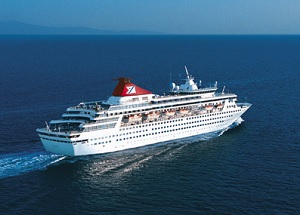One of the most commonly quoted reasons for not taking a cruise ship holiday is the chance of contracting one of the several vomiting and diarrhoea bugs that seem to enjoy they're annual holidays on cruise ships too.
Cruise ship operators do all they can to ensure you have an illness-free time on board but the persistency of the outbreaks seem to indicate the battle is being lost but is it only because outbreaks on ships are so often thrust into the public focus?
This weekend it’s been reported that 130 passengers, nearly 1 in 5 of the entire complement on a Fred Olsen Black Watch cruise, had gone down with a bug, believed to be a norovirus strain. Cruise operators are keen to point out that, despite the frequency of the reports in the media, such illnesses are uncommon at sea, accounting for less than 1 in 10 passengers.

The problem is that because of the close quarters on a ship and the access of the public toilets to all, viruses can spread quickly and it’s often a futile task to try to contain them as they can spread so fast.
If you’re unlucky enough to fall ill on board or even suggest to a crew member you’re feeling unwell, you are quarantined in your cabin for up to four days with a regulation diet intended to help the illness abate more quickly.
Once an outbreak is reported, the ship’s cleaning team go to work, disinfecting toilets and ensuring that all food preparation is carried out under a strictly hygienic regime. The Fred Olsen ship, upon returning to Rosyth, was almost immediately fumigated to destroy airborne viruses to reassure the next complement of passengers that it would be safe to travel.
Many ask how the epidemics begin in the first place as illnesses cannot begin without a bacterial or viral participant.
One has only to look at the world of biology to realise that such bacteria and viruses are omnipresent and, for most of the time, cause few or any problems. It’s only when ideal conditions for propagation present themselves that they become a problem.
The illnesses are often brought on board by passengers who are already hosts to them or can be contracted in any of the ports visited on the itinerary. Confined to a cruise ship, the illnesses can only spread amongst those on board and the recycling of the virus through the different areas of the ship means many are likely to succumb.
So, apart from not going on a cruise at all, what can be done to minimise or avoid the risk?
Health experts suggest avoiding crowded areas, salads or cold food. Spend as much time out on deck as possible. Wash your hands regularly, before meals and after going to the toilet and avoid touching door handles to and from toilets – use a tissue then dispose of it. Carry antibacterial hand wash with you and use it regularly and keep away from people who are ill.
Finally, on a salutary note, if you’re considering an all-inclusive holiday as an alternative, just think about the similarities!